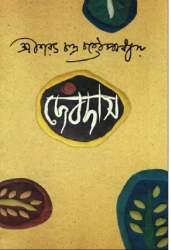Devdas
 Devdas - front cover | |
| Author | Sarat Chandra Chattopadhyay |
|---|---|
| Language | Bengali |
| Genre | Novel |
| Publisher | GCS |
Publication date | 30 June 1917 |
| Publication place | India |
| Media type | Print (hardback and paperback) |
Devdas (Template:Lang-bn, Debdas; Hindi: देवदास, Devdās) (also called Debdas) (1917) is a Bengali-language romance novel by Sarat Chandra Chattopadhyay written when he was only seventeen years of age.
Plot summary
Devdas is a young man from a wealthy Bengali Brahmin family in India in the early 1900s. Parvati (Paro) is a young woman from a middle class Bengali Brahmin family. The two families live in a village called Taalshonapur in Bengal, and Devdas and Parvati are childhood friends.
Devdas goes away for a couple of years to live and study in the city of Calcutta (now Kolkata). During vacations, he returns to his village. Suddenly both realise their easy comfort in each other's innocent comradeship has changed to something different. Devdas realises Parvati is no longer the small girl he knew. Parvati looks forward to their childhood love blossoming into their lifelong journey together in marriage. Of course, according to the prevailing social custom, Parvati's parents would have to approach Devdas' parents and propose marriage of Parvati to Devdas as Parvati longs for.
Parvati's mother approaches Devdas's mother, Harimati, with a marriage proposal. Although Devdas's mother loves Parvati very much she isn't so keen on forming an alliance with the next door neighbours. Also, Parvati's family has a long-standing tradition of accepting the dowry from the groom's family during the marriage rather than sending the dowry with the bride, which was the established custom (and still is, in many parts of India). This alternative custom influences Devdas's mother's decision of not considering Parvati as Devdas' bride, because she considers Parvati's family to be a "trading low caste" (becha-kena chotoghor) family, despite the fact that Parvati (like Devdas) is a Brahmin. The "trading" label is applied in context of the marriage custom followed by Parvati's family. Devdas's father, Narayan Mukherjee, who also loves Parvati, does not want Devdas to get married so early in life and isn't very keen on the alliance. Parvati's father, Nilkantha Chakravarti, feeling insulted at the rejection, finds an even richer husband for Parvati.
When Parvati learns of her planned marriage, she stealthily meets Devdas at night, desperately believing that he will accept her hand in marriage. Devdas has never previously considered Parvati that way. He feels surprised at Parvati's bravery of visiting him alone at night and also feels pained for her. He decides he will tell his father about marrying Parvati. Devdas' father disagrees.
In a confused state, Devdas then flees to Calcutta, and from there, he writes a letter to Parvati, saying that they are only friends. Within days, however, he realizes that he should have been bolder. He goes back to his village and tells Parvati that he is ready to do anything needed to save their love.
By now, Parvati's marriage plans are in an advanced stage, and she declines going back to Devdas and chides him for his cowardice and vacillation. She makes, however, one request to Devdas, that he would return to her before he dies. He vows to do so.
Devdas goes back to Calcutta and Parvati is married off to the betrothed widower, Bhuvan Choudhuri, who has three children. He is an elderly gentleman, the zamindar of Hatipota. He had found his house and home so empty and lustreless after his wife's death that he had decided to remarry. He spent most of his day in Pujas and looking after the zamindari.
In Calcutta, Devdas' carousing friend, Chunni Lal, introduces him to a courtesan named Chandramukhi. Devdas takes to heavy drinking at the courtesan's place, but she falls in love with him, and looks after him. His health deteriorates because of a combination of excessive drinking and despair - a drawn-out form of suicide. Within him, he frequently compares Parvati and Chandramukhi. Somehow he feels betrayed by Parvati, never realising that she was the one who had loved him first, and that she had said it out loud first. Chandramukhi does realize this, and tells him so. When sober, he hates Chandramukhi and loathes her presence. Therefore he drinks to forget his prejudices. Chandramukhi sees it all, feels it all and suffers silently, but she has seen that real man behind the fallen, aimless Devdas he now is and can't help but love him.
Sensing his fast-approaching death, Devdas goes to Hatipota to meet Parvati to fulfill his vow. He dies at her doorstep on a dark, cold night. On hearing of the his death, Parvati runs towards the door, but her family members prevent her from stepping out of the door.
The novella powerfully depicts the prevailing societal customs in Bengal in the early 1900s, which are largely responsible for preventing the happy ending of a sincere love story.
Film, TV, and theatrical adaptations
The novel has been made into films in many Indian languages, including Bengali, Hindi, Telugu, Tamil, Urdu, Assamese and Malayalam.[1][2][3] It is the most filmed non-epic story in India.
Notable film versions of the novella include:
- In the film Haath Ki Safai, a song in the movie is about the play Devdas with Randhir Kapoor as Devdas and Hema Malini as Chandramukhi.[4]
See also
References
- ^ Sharma, Sanjukta (June 7, 2008). "Multiple Takes: Devdas's journey in Indian cinema - from the silent era of the 1920s to the opulent Hindi blockbuster of 2002". Livemint. Retrieved 2009-02-22.
- ^ The Hindu : The immortal lover
- ^ Devdas phenomenon Archived January 13, 2012, at the Wayback Machine
- ^ Peene Walon Ko Peene Ka Bahana Chahiye - Haath Ki Safai 1974 1080p HD
